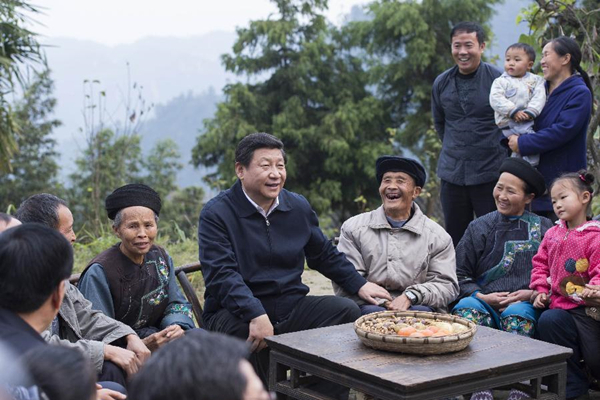


 |
|
Chinese President Xi Jinping (C) talks with local villagers and cadres at Shibadong Village in Paibi Township of Huayuan County in the Tujia-Miao autonomous prefecture of Xiangxi, central China's Hunan Province, November 3, 2013.[Photo/Xinhua] |
Fancy a free Kindle? Take this Long March quiz.
When I walked into the Hunan villages with more than 50 fellow reporters, all wearing the same white T-shirts and carrying cameras, I was greeted with curious yet smiling faces from local people everywhere.
This made me wonder whether the Red Army soldiers were given the same kindness and hospitality here 80 years ago when they suffered from extreme hunger and tiredness.
The answer is yes.
In Tongdao Dong autonomous county, villager Yang Zhengyi, who is around 70 years old, told us that his father used to be the guide for the Red Army. In 1934, a meeting in the county, close to the border between Hunan and Guizhou province, was convened to discuss the direction of the Red Army. During the meeting, Mao Zedong suggested the Red Army should change direction towards Guizhou, where the enemy defenses were expected to be weak, instead of marching further into Hunan.
"My father guided and walked with them for three days and three nights until they reached Guizhou," said Yang, adding that his father was in his twenties back then.
In Hunan, the route of the Long March covers hometowns of many ethnic minorities. Most of the people stick to their own language and don't understand mandarin even today.
In Shibadong, a small village hiding in the deep mountains in the Xiangxi Tujia-Miao autonomous prefecture, 76-year-old Long Decheng held my hands and asked me where I am from. That is probably the only mandarin she has known her whole life.
We had to communicate through a translator who can speak both Miao dialect and mandarin.
During the Long March, chased and encircled by the Kuomintang (KMT), the Red Army marched through 14 provinces which are home to over 10 ethnic groups, encountering dramatically different natural and cultural environments.
How could the Red Army communicate with local people and win their support? The key is the so-called "mass line", which was conducted wherever the army reached and proved effective.
Inside the army, soldiers were strictly disciplined to never take any advantage of the people. They were forbidden from entering local people's houses and taking food or other property without paying.
On the other hand, the Red Army built "flesh-and-blood" ties with the people during the Long March. The Red Army set up a specialized organization to deal with minority ethnic groups with tailored policies. The army upheld religious freedom and respected their customs. They also helped ethnic minorities to establish their own government and army.
The heartfelt and selfish giving of the Red Army was rewarded with enormous kindness from local people, who had contributed both man power and material resources to the success of the Long March. Some of them even sacrificed their lives for the great cause.
Their contribution will never be forgotten by the Party and the people.
In 2013, President Xi Jinping visited the Shibadong village and for the first time put forward the concept of "targeted poverty alleviation", which has greatly improved the life of Long Decheng and her family.
"Our Party comes from the people, is rooted in the people, and serves the people. Without popular support, none of the Party's achievements or aspirations would be possible," President Xi once said.
"Under no circumstances will we ever forsake our commitment to sharing weal and woe with the people. We will never forgo the historical materialist view point which regards the people as the true heroes."
Xi also said that as has been the case throughout the Party's history, its close ties with the people are the embodiment of its nature and purpose, the hallmark that distinguishes the CPC from other political parties, and an important factor enabling the CPC to grow strong. The fate of the Party's undertakings relies on whether it can maintain its ties with the people.
Therefore, as we celebrate the victory of the Long March today, we should never forget those ordinary people from various ethnic groups, who may not even understand our language yet still remember the history vividly. It's the Party's responsibility to lift more people out of poverty and provide a better life for everyone, which is the goal of the new Long March.
Fancy a free Kindle? Take this Long March quiz.
